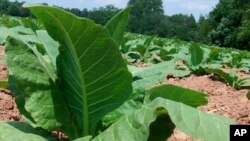Zimbabwe’s Tobacco Industry and Marketing Board has announced the 2011 sale of more than 140 million kilograms of tobacco generated $517 million in revenue – an increase of more than $100 million from last year.
But, Harare-based economist John Robertson warns that the uptick in production and revenue should not distract from the potential risk of future deforestation, due to new curing methods being used.
“The farming methods being applied right now are environmentally damaging and very threatening to the long term prospects of the farming sector,” said Robertson.
Before farming land was taken over by the government in 2000 and redistributed, the mostly white-owned farms used coal fires to cure tobacco. According to Robertson, many of the nation’s small-scale tobacco farmers now use firewood to cure their tobacco, instead of coal. With tens of thousands of farmers chopping down nearby trees for firewood, Robertson said there is a 'desertification' threat in Zimbabwe's tobacco farming regions.
After the government land reform, tobacco production dropped significantly but, since 2009, has been on the rise, though is still off from peak-2000 numbers. Robertson said, since the land on those few large farms has been parceled out into tens of thousands of tobacco farms, the average grower farms about two hectares.
He also warned that an increase in global production of tobacco in next year’s markets could cause a drop in prices for the average Zimbabwe tobacco farmer who, according to a recent New York Times article, makes an average of $6,000 US a year.
Robertson acknowledges this salary is well above the income of around $800 US that a worker used to earn before land reform, if he was employed by one of the large tobacco operations. But, he argued that the lower salary doesn’t reflect the healthcare, educational and other benefits those workers received.
Since land reform, it’s not just the sellers who have changed. Today, China is the biggest buyer of Zimbabwe’s tobacco.
“When our principle markets were in Europe, the European buyers were much fussier than the Chinese buyers,” said Robertson. “In China, they find that a small quantity of Zimbabwe tobacco, of almost any quality, so dramatically improves the quality of the Chinese tobacco that the cigarette becomes very much more acceptable to the smoking public.”
But, Harare-based economist John Robertson warns that the uptick in production and revenue should not distract from the potential risk of future deforestation, due to new curing methods being used.
“The farming methods being applied right now are environmentally damaging and very threatening to the long term prospects of the farming sector,” said Robertson.
Before farming land was taken over by the government in 2000 and redistributed, the mostly white-owned farms used coal fires to cure tobacco. According to Robertson, many of the nation’s small-scale tobacco farmers now use firewood to cure their tobacco, instead of coal. With tens of thousands of farmers chopping down nearby trees for firewood, Robertson said there is a 'desertification' threat in Zimbabwe's tobacco farming regions.
After the government land reform, tobacco production dropped significantly but, since 2009, has been on the rise, though is still off from peak-2000 numbers. Robertson said, since the land on those few large farms has been parceled out into tens of thousands of tobacco farms, the average grower farms about two hectares.
He also warned that an increase in global production of tobacco in next year’s markets could cause a drop in prices for the average Zimbabwe tobacco farmer who, according to a recent New York Times article, makes an average of $6,000 US a year.
Robertson acknowledges this salary is well above the income of around $800 US that a worker used to earn before land reform, if he was employed by one of the large tobacco operations. But, he argued that the lower salary doesn’t reflect the healthcare, educational and other benefits those workers received.
Since land reform, it’s not just the sellers who have changed. Today, China is the biggest buyer of Zimbabwe’s tobacco.
“When our principle markets were in Europe, the European buyers were much fussier than the Chinese buyers,” said Robertson. “In China, they find that a small quantity of Zimbabwe tobacco, of almost any quality, so dramatically improves the quality of the Chinese tobacco that the cigarette becomes very much more acceptable to the smoking public.”




